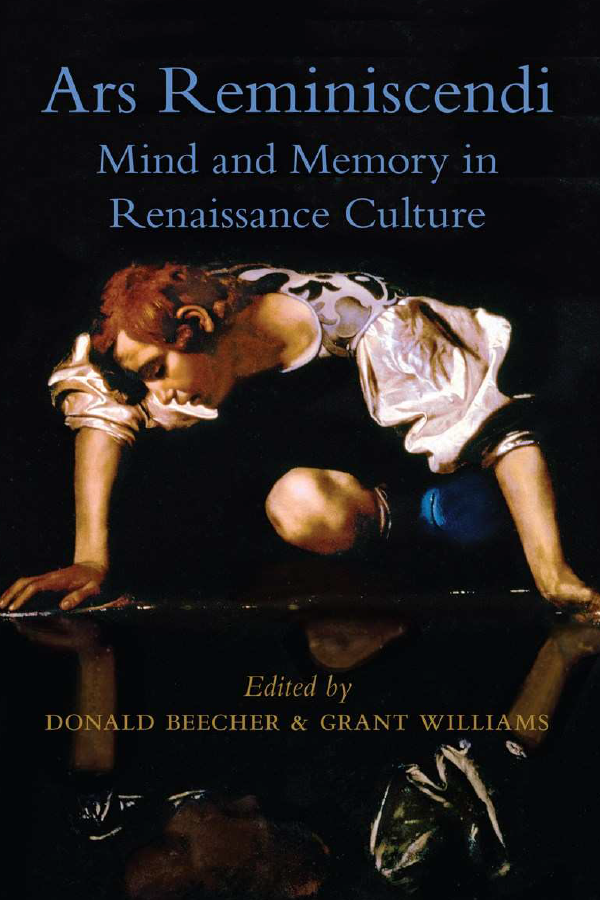Ars Reminiscendi: Mind and Memory in Renaissance Culture
Edited by Donald Beecher and Grant Williams - ES19
Overview
The Art of Memory in Renaissance scholarship was, for many years, confined to a footnote in classical rhetoric, until Francis Yates’s groundbreaking study of 1966 argued for its considerable influence on hermetic philosophy and literature. Over the last few decades, another shift in scholarship has occurred that goes well beyond Yates’s conceptualization of memory as an occult and occulted phenomenon in the history of ideas. Recent studies suggest memory to be less a theme or idea than the prevailing episteme, whose discourses, practices, and mentations produce and reproduce Renaissance culture. Humanism’s project of recovering the past by retrieving and reconstructing textuality privileges recollection as a mode of epistemological engagement with the world, as a means of subjective and collective identity formation, and as an organ for achieving ethical goals. For that reason, memory finds itself involved in the passage to modernity, when its ascendancy is challenged by the rise of seventeenth-century science and fall of rhetoric, the emergence of the European nation state, and the explosion of the printing press and book technologies. Acknowledging this new direction in scholarship, this volume seeks to trace the plurality and complexity of memory’s cultural work throughout the English and Continental Renaissance. Among the thinkers and writers to receive attention are Thomas Hoby, Conrad Gesner, Erasmus, Conrad Celtis, Johann Sturm, Machiavelli, Jehan du Pré, Spenser, Robert Hooke, Milton, Sebastian Münster, and Shakespeare. A long critical and historical afterword extends the historical contexts around the contributions and provides an overview of the materials central to the field, as well as a sense of the field’s future development.
Edited by Donald Beecher and Grant Williams
Donald Beecher and Grant Williams teach Renaissance literature and culture in the Department of English at Carleton University in Ottawa.
440 pp.
ISBN: 978-0-7727-2048-1 softcover
Published: 2009
Contents
Donald Beecher, “Introduction: The Crisis of Memory “
I. Revisioning The Classical Art of Memory
1. Brenda Dunn-Lardeau, “The Mnemonic Architecture of the Palais des nobles Dames (Lyons, 1534): In Defence of Famous Women “
2. Andrea Torre, “Patterns and Functions of the Mnemonics Image in the Sixteenth and Seventeenth Centuries”
3. Wolfgang Neuber, “Mnemonic Imagery in the Early Modern Period: Visibility and Collective Memory”
II. Manuscripts, Commonplace Books, and Personal Recollection
4. James Nelson Novoa, “A Sephardic Art of Memory”
5. Kenneth R. Bartlett, “Experience Recollected in Tranquility: Thomas Hoby’s Travel Journal as Constructed Memory”
6. Victoria E. Burke, “‘Memorial Books’: Commonplaces, Gender, and Manuscript Compilation in Seventeenth-Century England”
III. Learning, Rhetoric, and the Humanist Challenge
7. Paul Nelles, “Reading and Memory in the Universal Library: Conrad Gessner and the Renaissance Book”
8. John Hunter, “The Well-Stocked Memory and the Well-Tended Self: Erasmus and the Limits of Humanist Education”
9. Marie-Alice Belle, “Johann Sturm’s ‘Figurative Drafts’: Memory, Imitation, Reminiscence in Nobilitas Literata (1549)”
IV. Ethics and Memory in English Literature
10. Raymond B. Waddington, “Paradise Lost: Memories Are Made of This”
11. Andrew Wallace, “‘What’s Hecuba to Him?’: Pain, Privacy, and the Ancient Text”
V. Nations, Historiography, and Cultural Identity
12. Joseph Khoury, “Machiavelli Manufacturing Memory: Terrorizing History, Historicizing Terror”
13. Danièle Letocha, “The Duty of Memory: The Contradictions in Conrad Celtis’s Oratio (1492)
14. Christopher Ivic, “Spenser and Interpellative Memory”
VI. Natural Memory vs. Artificial Recollection
15. Grant Williams, “The Transmateriality of Memory in Early Modern Psychophysiological Discourse”
16. Rhodri Lewis, “Hooke’s Two Buckets: Memory, Mnemotechnique and Knowledge in the Early Royal Society”
VII. Postscript
17. Donald Beecher, “Recollection, Cognition, and Culture: An Overview of Renaissance Memory"
Reviews
Renaissance Quarterly, 62:4 (Winter 2009), pp. 1225-1226. Reviewed by Dorothy L. Stegman.
Literature & History, 19:2 (2010), pp. 97-98. Reviewed by Matthew Neufeld.
Couldn't load pickup availability


